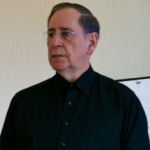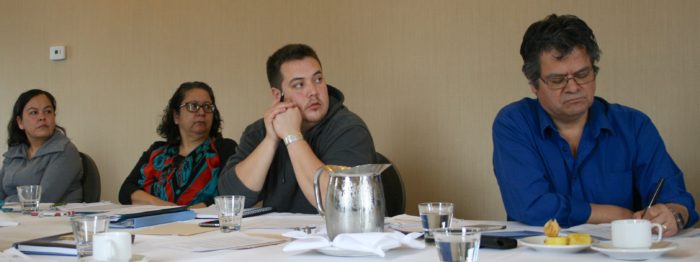Money talks, NmTC Board listens
By Mark Kiemele
Money is often on the agenda when Naut’sa mawt Tribal Council’s board of directors meet. But when billions of dollars are under discussion, it gets the attention of everyone. The presentation by Harold Calla of Squamish Nation was about money – and much more. The executive chair of the First Nations Financial Management Board visited T’Souke Nation’s territory to inform NmTC directors about a newly formed group called the First Nations major projects coalition. If that sounds a bit dull, Calla had a few zingers to wake people up, such as:
“Beads and trinkets not going to happen here.”
“The last thing bureaucracy wants is for First Nations to get organized.”
“Why do we let money go to Ottawa and then have to go beg to get it back?”
 The major projects coalition has received seed money from Canada. It now wants to convince the Trudeau government that loan guarantees are the only way to ensure that First Nations become truly equal partners in projects tapping into natural resource wealth across the country.
The major projects coalition has received seed money from Canada. It now wants to convince the Trudeau government that loan guarantees are the only way to ensure that First Nations become truly equal partners in projects tapping into natural resource wealth across the country.
“How do we move the goal posts?” asked Calla. “That’s the purpose of the coalition… In order to consider projects, First Nations need to understand what they’re being asked to participate in. We need free prior and informed consent.”
Since the First Nations Finance Authority was established, about $250 million has been lent across Canada. But that money, loaned for periods of 10-30 years, is small change compared to what is needed for First Nations to become true equity partners in projects.
“To fulfill our traditional duties, we have to sit at boardroom tables,” Calla said. He talked about the many proposals, both large and small, that come across the desks of First Nation leaders. “We should define terms rather than just responding to proposals. But that’s difficult to do as one nation and it sometimes seems like they’re picking us off, one at a time.”
And while projects such as oil sands, pipelines, mining and logging can be detrimental to people and cultures, Calla said there can only be power if First Nations are partners in such projects. “We’re all about the money. It’s what we do with it that’s different,” he said.
“Self-government, inherent rights… How do we bring life into these things?” he asked. “We have to quantify the value of our traditional territories, for a start. “I’m not saying we should always say ‘yes’, but we need to be able to say ‘no’ knowledgeably. That’s why we have come together as a group with the federal government’s support. “Industry doesn’t control us any more, but don’t be afraid of it,” Calla said. “I don’t fear projects proceeding, unless they proceed without our involvement.
“If we believe in Aboriginal rights and title and believe in all those court decisions, we have to stand up… bring life into these things.”




